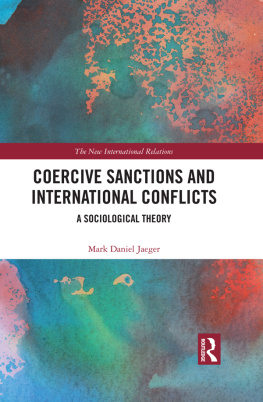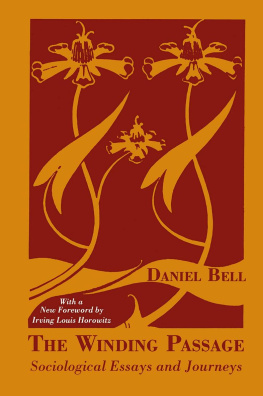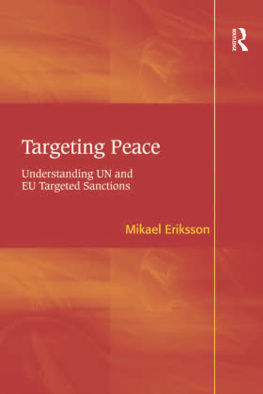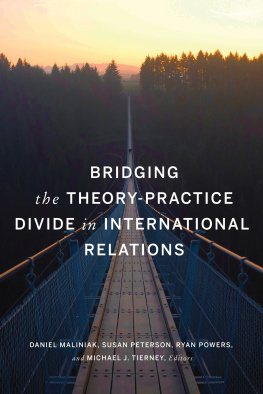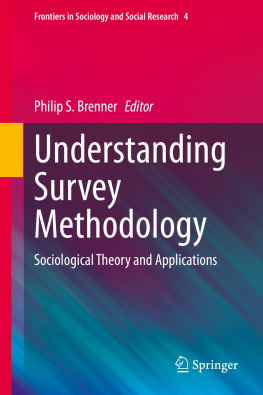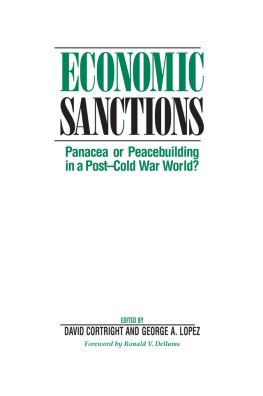This book offers a conceptually rich reassessment of the usefulness of international sanctions. However, it does more than that and warrants reading by even those students of international relations not primarily dealing with sanctions. Mark Daniel Jaegers book demonstrates that theory-building in IR is not something that happens in the thin air of abstract arguments only, but can be driven by dealing with substantive issues.
Mathias Albert,Bielefeld University, Germany
This is the most convincing theory to date for the analysis of international sanctions and therefore exceedingly important for practically managing some of the most explosive conflicts on the current policy agenda. At the same time, its careful and creative theory building at the intersection of sociological theories of conflict and International Relations theories of securitization ought to inspire further innovative theorizing for other topics. Go read, go theorize current conflicts call for work like this.
Ole Wver,University of Copenhagen, Denmark
Coercive Sanctions and International Conflicts
Perhaps the most common question raised in the literature on coercive international sanctions is: Do sanctions work? Unsurprisingly, the answer to such a sweeping question remains inconclusive. However, even the widely presumed logic of coercive sanctions that economic impact translates into effective political pressure is not the primary driver of conflict developments. Furthermore, existing rationalist-economistic approaches neglect one of the most striking differences seen across sanctions conflicts: the occurrence of positive sanctions or their combination with negative sanctions, implicitly taking them as logically indifferent.
Instead of asking whether sanctions work, this book addresses a more basic question: How do coercive international sanctions work, and more substantially, what are the social conditions within sanctions conflicts that are conducive to either cooperation or non-cooperation? Arguing that coercive sanctions and international conflicts are relational, socially constructed facts, the author explores the (de-)escalation of sanctions conflicts from a sociological perspective. Whether sanctions are conducive to either cooperation or non-cooperation depends on the one hand on the meaning they acquire for opponents as inducing decisions upon mutual conflict. On the other hand, negative sanctions, positive sanctions or their combination each contribute differently to the way in which opponents perceive conflict, and to its potential transformation. Thus, it is premature to predict the political effectiveness of sanctions simply based on economic impact.
The book presents analyses of the sanctions conflicts between China and Taiwan and over Irans nuclear program, illustrating how negative sanctions, positive sanctions and their combination made a distinct contribution to conflict development and prospects for cooperation. It will be of great interest to researchers, postgraduates and academics in the fields of international relations, sanctions, international security and international political sociology.
Mark Daniel Jaeger is a post-doctoral researcher at the Center for Advanced Security Theory, University of Copenhagen.
The New International Relations
Edited by Richard Little
University of Bristol
Iver B. Neumann
Norwegian Institute of International Affairs (NUPI), Norway
Jutta Weldes
University of Bristol
The field of international relations has changed dramatically in recent years. This new series will cover the major issues that have emerged and reflect the latest academic thinking in this particular dynamic area.
Evaluating Progress in International Relations
How do you know?
Edited by Annette Freyberg-Inan, Ewan Harrison and Patrick James
Russia and the Idea of Europe 2nd Edition
A study in identity and International Relations
Iver B. Neumann
Memories of Empire and Entry into International Society
Views from the European periphery
Edited by Filip Ejdus
Great Power Multilateralism and the Prevention of War
Debating a 21st century concert of powers
Edited by Harald Mller and Carsten Rauch
De-Constructing the Dynamics of World-Societal Order
The power of governmentality in Palestine
Jan Busse
Raymond Aron and International Relations
Edited by Olivier Schmitt
Coercive Sanctions and International Conflicts
A Sociological Theory
Mark Daniel Jaeger
A full list of titles is available here: www.routledge.com/New-International-Relations/book-series/NEWIR
First published 2018
by Routledge
2 Park Square, Milton Park, Abingdon, Oxon OX14 4RN
and by Routledge
711 Third Avenue, New York, NY 10017
Routledge is an imprint of the Taylor & Francis Group, an informa business
2018 Mark Daniel Jaeger
The right of Mark Daniel Jaeger to be identified as author of this work has been asserted by him in accordance with sections 77 and 78 of the Copyright, Designs and Patents Act 1988.
All rights reserved. No part of this book may be reprinted or reproduced or utilised in any form or by any electronic, mechanical, or other means, now known or hereafter invented, including photocopying and recording, or in any information storage or retrieval system, without permission in writing from the publishers.
Trademark notice: Product or corporate names may be trademarks or registered trademarks, and are used only for identification and explanation without intent to infringe.
British Library Cataloguing-in-Publication Data
A catalogue record for this book is available from the British Library
Library of Congress Cataloging-in-Publication Data
A catalog record for this book has been requested
ISBN: 978-1-138-69717-1 (hbk)
ISBN: 978-1-315-52243-2 (ebk)
Typeset in Times New Roman
by Apex CoVantage, LLC
Dedicated to Marlene and Sophia .
First and foremost, I owe a very special thanks to my wife, Sonja, and to my children for their love and steadfast support during the research for, and writing of, this book. I am also greatly indebted to Mathias Albert, Ole Wver and Andreas Wenger for their critical assessment, insightful commentary and invaluable support along this journey. My gratitude goes to Jrn Richert for countless discussions and reflections on science, theory and the meaning of academia. The book emerged from my doctoral dissertation at ETH Zurich. I am indebted to my colleagues for their thoughts and comments and for the good times we shared, most of all to Myriam Dunn Cavelty, Jonas Hagmann, Ulla Jasper, Wilhelm Mirow and Alrik Thiem. I would like to thank Charles Glaser and Martha Finnemore for their hospitality at the Elliott School of International Affairs and for their advice at a crucial moment during my time as a PhD student. Many thanks also to the three anonymous reviewers of the initial book project who provided crucial input for the books further development and refinement.
I also owe the success of this project to the exchange with my fellow colleagues working on other theory-laden topics or partaking in a similar work experience: Olaf Corry, Joscha Wullweber, Julia Sattelberger, Andrew Neal, Trine Villumsen Berling and Malte Gephart. Similarly of essence was the invigorating support of Sebastian Meraner and Tim Kilb.

